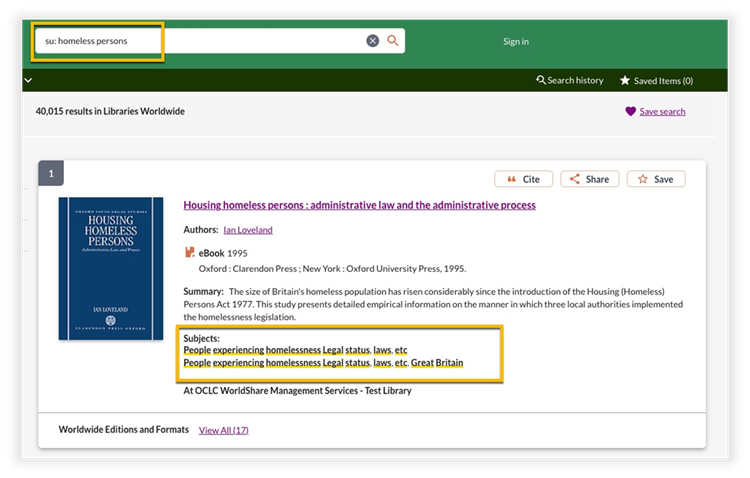[This blog post was co-authored with Grace McGann, Associate Product Manager. Thanks to Erica Melko for giving valuable feedback on a draft of this post.]
WorldCat Discovery is a discovery tool mostly used by academic libraries. It enables users to access global and local collections in a local interface that has been customized by their libraries. A recently introduced locally preferred subjects feature is part of a WorldCat Discovery Diversity, Equity, and Inclusion (DEI) initiative that helps libraries reduce harm in item descriptions for their local users. The first phase of this project enables libraries to locally re-map subject headings to display locally preferred subjects, creating a more inclusive experience for a library’s local community. This initiative was inspired by the outcomes of the Reimagine Descriptive Workflows project, which sought community input on ways to improve descriptive practices, tools, infrastructure, and workflows in libraries and archives. Read to learn more about this new WorldCat Discovery feature, the research and community input informing this work, and how we’re hoping to build toward a community of practice.
The Reimagine Descriptive Workflows project convened cataloging experts and practitioners to explore ideas for understanding and addressing harm caused by cultural institutions’ collection descriptions. Many of those participating talked about their need for tools to help them correct past harm and insensitive, offensive, or outdated descriptions. One of the attendees of that meeting was Jay Holloway, OCLC’s Director of End User Platform Services. One of Jay’s takeaways from the meeting was that there was an opportunity to rapidly reduce harm to patrons while other solutions were being worked on. To address harmful descriptions in the short term, Jay and his team partnered with libraries to develop a new WorldCat Discovery feature that enables library staff to locally re-map subject headings to offer a more inclusive experience for library users in their community.
Library description currently relies on subject authorities that may be outdated, contain terms that harm marginalized communities, or do not accurately reflect the identities, lived experiences, or values of those described. The process to change these subject authorities is slow, while the harm they can cause is present and urgent. The locally preferred subjects feature was created to facilitate rapid harm reduction while the library community waits for much-needed long-term change and solutions.

Librarians served as development partners on this effort, which started with discussions in November 2021, continued into further discussions in March 2022, and remained ongoing throughout the development process. The feature had its first release in August 2022 and additional enhancements were delivered in October 2022. Development partners were eager to address this urgent need by showing language that is more supportive and inclusive to their users.

Locally preferred subjects are defined by libraries for local display in this new feature. These subjects do not change the underlying authority data or cataloging record, and do not impact any other institution’s WorldCat Discovery site. Locally preferred subjects do not impact the discoverability of items. Users can still use their own search terms to find what they are looking for.
One of the key findings in Reimagine Descriptive Workflows: A Community-informed Agenda for Reparative and Inclusive Descriptive Practice is that “Appropriate descriptive language is a complex space that centers on human identity and relationships.” In a global setting, cultural context may not lend itself to “one-size-fits-all” solutions in resource discovery or resource description. By partnering with libraries to develop, test, and implement this new WorldCat Discovery feature for local subjects, we’ve been able to help librarians take a small but important first step toward creating a less harmful discovery experience.
Our hope for this work is to create a community of practice, where institutions feel supported in finding more inclusive terms to use within their own communities. One way we are facilitating this is through the local subject re-mapping template. Institutions can download this for local use to edit and adjust to meet their needs before uploading this into Service Configuration for their WorldCat Discovery institution. They can also use the shared template to benefit from the work other institutions are doing. Our partners are encouraged to share the inclusive subjects they have defined in this central file to encourage collaboration and development. This resource changes and grows as our community contributes to it.
OCLC is always looking for new ways to be a better partner to our libraries. In implementing this feature, we are working to broaden our support for libraries’ DEI initiatives. We are continuing to make updates to this feature to help libraries serve their communities. The next phase of this feature will include the ability to specify the authority source for a local subject re-mapping, as well as the power to define local search expansions that support locally inclusive subjects.
Merrilee Proffitt is Senior Manager for the OCLC RLP. She provides community development skills and expert support to institutions within the OCLC Research Library Partnership.



